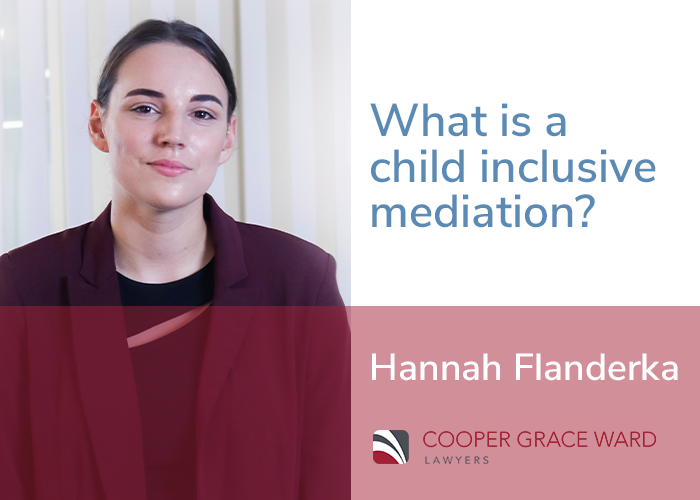Cooper Grace Ward is proud to announce prestigious international legal research firm Chambers & Partners has listed lead litigation and dispute resolution partner Rocco Russo and his team in its ...

In this video, CGW family lawyer Hannah Flanderka talks about child inclusive mediations. Watch to learn what they are, how they work and when they might be suitable for your circumstances.
Hi, my name’s Hannah Flanderka and I am a lawyer in the family law team here at Cooper Grace Ward. In today’s video, I thought we would look at what a child inclusive mediation is, how it works, and when it might be suitable for your circumstances.
So, what is a child inclusive mediation? Essentially, it is designed to encourage a safe environment for children to be involved in their parents negotiations process for parenting arrangements without, I suppose, exposing them to any kind of conflict and shielding them from the family law process as much as possible.
Essentially what it involves is that parents will appoint what’s called a child trained specialist who will meet with the children and discuss a range of topics. This includes, for example, the parties’ separation, what kind of arrangements they currently have for their care, and also what arrangements the children may like for the future.
The specialist will also usually speak with the parents individually and separately to speaking to the children and this may occur before or after they interview the children. The child specialist is usually a psychologist who has specialised training in working with children who have experienced separation. They are also sometimes called a child consultant.
During the interview with the children, the child consultant will skillfully and carefully ask the children a range of questions. For example, they will ask perhaps how they’re going at school, what kind of activities they enjoy, and also how they feel about any conflict that the parents may be experiencing in order to ascertain their views. The child consultant will usually do so through a subtle rather than direct and confronting approach, such as by engaging in games with the child. For example, in one matter, I’ve had a child consultant engage in, there was three children and they got the child to each draw a picture of what they would describe as the family tree and what it looked like and that gave some insight into how the child experiences the family relationships.
The parties will then attend a mediation separately, which the children do not attend. During the mediation, the child consultant will convey what the children have told them about their wishes and also provide some expert opinion about the child’s needs and perhaps any issues of risk that they may have identified after speaking with the children. The child consultant may or may not also act as the mediator during the mediation, provided they have the appropriate qualifications of course. If the parties choose to engage a separate person to act as the mediator, normally the child consultant can also remain in order to provide some insight into the children’s views throughout the mediation process.
So, when should you engage in a child inclusive mediation? Under the Family Law Act, the Court can have regard to any views expressed by the children when determining what orders to make in parenting matters for their care. For small children it can be difficult for the Court to attach much weight to their views. However, for children in their early or late adolescence, it is easier for the Court to consider their views and make orders which reflect those wishes. Provided it is also, of course consistent with their best interests. Therefore, a child inclusive mediation can be very helpful for children who are of an age where they can express an independent view of their wishes. For children who cannot do so, a child inclusive mediation may be less helpful, and it may be more appropriate, for example, for the parties to engage a family report writer to prepare a report on the children’s best interests instead.
A family report involves a similar process of a specialist expert meeting with the children or being in their presence, and then making an assessment of what they consider to be in the children’s best interest and making recommendations about their care after also interviewing the parents. While a child inclusive mediation can be an expensive process, it is usually very worth while as it provides independent feedback from an expert about the children’s wishes with a view, of course, to securing an arrangement that will be in the child’s best interests overall.
If you have any questions about child inclusive mediations or a family law inquiry in general, please do not hesitate to contact me or one of the other family law team members at Cooper Grace Ward.
This publication is for information only and is not legal advice. You should obtain advice that is specific to your circumstances and not rely on this publication as legal advice. If there are any issues you would like us to advise you on arising from this publication, please let us know.
Subscribe to our interest lists to receive legal alerts, articles, event invitations and offers.



Cooper Grace Ward acknowledges and pays respect to the past, present and future Traditional Custodians and Elders of this nation and the continuation of cultural, spiritual and educational practices of Aboriginal and Torres Strait Islander peoples.
Fast, accurate and flexible entities including companies, self-managed superannuation funds and trusts.